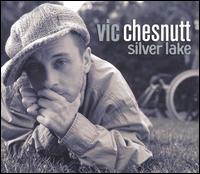Vic Chesnutt
Silver Lake (New West Records)
By: Stan Hall

 One night about a decade ago, Vic Chesnutt played a solo acoustic show at the 40 Watt, in his hometown of Athens, Georgia. During the concert, the singer of the most famous band ever to come out of Athens, a man who was at the height of his international fame at the time, persisted in yelling at Chesnutt to play "Lucinda Williams," a song from one of his earliest albums. Chesnutt ignored him and never played it.
One night about a decade ago, Vic Chesnutt played a solo acoustic show at the 40 Watt, in his hometown of Athens, Georgia. During the concert, the singer of the most famous band ever to come out of Athens, a man who was at the height of his international fame at the time, persisted in yelling at Chesnutt to play "Lucinda Williams," a song from one of his earliest albums. Chesnutt ignored him and never played it.The moment was pure Vic: It didn't matter who was hollering the requests -- he was going to play what he wanted to play. It's a credo that has served Chesnutt well through the years, paying off handsomely yet again on his ninth album, "Silver Lake," so named for the area of Los Angeles in which it was recorded and mixed in an inspired fortnight. Like his past efforts, it's a collection of funky, soulful Southern Gothic roots music, made unique by Chesnutt's fearless, outrageously imaginative poetry and marvelously exhausted voice.
Sound-wise, "Silver Lake," with its freewheeling but spare production, is somewhat similar to "The Salesman and Bernadette," Chesnutt's 1998 collaboration with his wife Tina and the Nashville experimental country ensemble Lambchop. Producer Mark Howard, who did engineering work on R.E.M.'s "Automatic for the People" and Bob Dylan's "Time Out of Mind," as well as producing records by Marianne Faithfull and the Tragically Hip, brought Chesnutt to a studio inside the Paramour Mansion, on a hill overlooking downtown L.A., and surrounded him with a group of talented, sympathetic musicians. The band gives some of Chesnutt's fragile tunes a varied sound, ranging from the delicate, uplifting accompaniment on the shut-in soliloquy "Stay Inside," to the faux-Middle Eastern sound of "Zippy Morocco," to the muscular, Crazy Horse guitar frenzy of "2nd Floor."
Chesnutt's talent for story-songs abounds once again. "Band Camp" is a sharply drawn reflection on a teenage crush, full of rich, sometimes bizarre details (like the part about the girl getting drunk on a vodka-soaked tampon -- with the tampon being applied in its usual manner). "Fa-La-La" is a hoot, a superb R.E.M. song (except, well, it isn't) that uses the melody hook of The Captain & Tennille's "Do That to Me One More Time" to launch a bittersweet tale of a convalescent who finds true love in a fellow patient ("the embodiment of life force in a hospital gown"), only to be released from the hospital at his moment of true happiness. Chesnutt slyly leaves undetermined whether the object of the narrator's desire welcomes or even knows about the crush.
On "Girl's Say" (also titled "Girls Say" elsewhere in the CD booklet), Chesnutt tackles male-female relationships by adopting voices to spout stereotypical utterances made by both genders. Neither portrayal is flattering: The man is macho, insensitive, crude ("hey, look what I can do!"; "show me all your boobs"; "why you wanna be a bitch?"), while the woman is obsequious, sensitive, needy ("can I get you anything?"; "please don't yell at me"; "I could use a backrub"). It's all so simplistic and borderline offensive, but the quirky, slow, wah pedal arrangement and Chesnutt's sweet-as-pie delivery sell the song. By the end one realizes that while he's just having fun at the characters' expense, his assertion that "physiology is no mystery" holds true -- a lot of relationships consist of two people who, frankly, deserve each other and their accompanying baggage. It's the rare songwriter who can make something so complex and negative and sound so simple and funny.
Even the album's major misstep is brilliant. The eight minute-plus "Sultan, So Mighty" is a torturous crawl of a song, with Chesnutt warbling almost endlessly in a high falsetto that's unnatural and discomfiting. But he's singing that way for a reason -- the song is presented from the point of view of a eunuch serving as a liaison between an impotent sultan and the harem he's having trouble pleasing. It's such a marvelous idea that you'll find yourself applauding the song even as you skip by it after the first minute or two.
All of this sets up the closer, "In My Way, Yes," a peaceful meditation on love that ranks among Chesnutt's greatest songs. In an arrangement similar to the Beatles' "With A Little Help From My Friends," a three-part harmony poses questions about the narrator's ability to accept and embrace love ("Do you think it makes a difference?"; "Do you think you deserve it?"), to which Chesnutt resolutely replies, "I say yes," going on in eloquent detail to express his gratitude at living long enough in the world to receive the blessings he enjoys today. It's a truly lovely conclusion to yet another highly personal, idiosyncratic and musically rich collection of songs from one of America's best songwriters. Grade: A-minus

